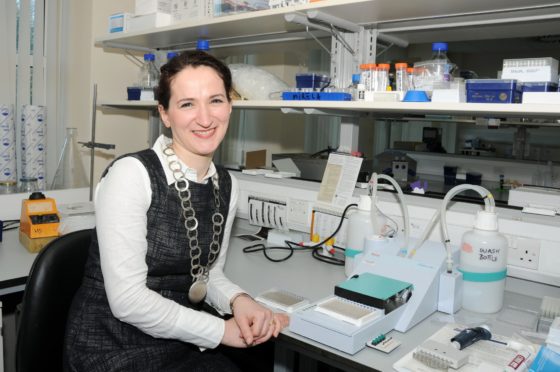Aberdeen University will use artificial intelligence in an attempt to develop a fast-track test that could help in the mass screening process for Covid-19.
The Scottish Government has given the £140,000 project the green light, allowing researchers begin working to identify specific elements of the virus that trigger the body’s defence systems.
The team will work with Vertebrate Antibodies Ltd (Val) and their technology to develop a sensitive test that could then be used for mass screening of NHS staff and keyworkers.
It would help identify high-risk patients and carriers, provide data on the prevalance of Covid-19 and allow for targeted vaccinations in the future.
Lead investigator Professor Mirela Delibegovic said: “By working with Val’s team and using their established expertise in antibody design and production enhanced by harnessing artificial intelligence, we hope to create a diagnostic test that can quickly and effectively identify Covid-19 in individuals.
“By employing this innovative approach, we hope to achieve high-throughput capacity in a proven format that will enable mass testing which could benefit key workers and the most vulnerable members of society.”
The project has received £101,903 funding from the Scottish Government as well as a £38,000 contribution from Val – a bio-tech spin-out company from Aberdeen University – and is due to last six months.
Dr Ayham Alnabulsi, co-founder and chief executive of Val, added: “Vertebrate Antibodies is pleased that it is able to contribute its proprietary AI technology, EpitopePredikt, and the expertise of its technical team to help develop an assay that could underpin a test that would help with the national effort to manage the COVID-19 pandemic.”
The project was pitched in response to the Scottish Government’s funding announcement for research aimed at tackling the challenges of the pandemic.
St Andrews University has also been awarded three research projects as part of the rapid research programme.
Professor Colin McCowan will lead research using a tracker app to explore differences between patients, identify community cases and link this with medical records.
The second project, led by Dr Nathan Bailey, will look at the evolution of the virus strain that causes Covid-19.
And Dr Ruth Bowness will use a mathematical model to stimulate the infection in the body and the spread from person to person to create predictions.
